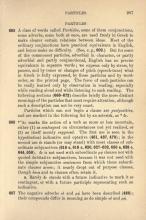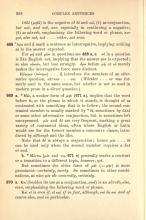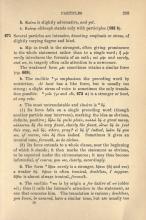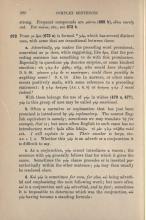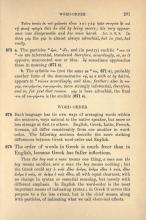665. A class of words called Particles, some of them conjunctions, some adverbs, some both at once, are used freely in Greek to make clearer certain relations between ideas. Most of the ordinary conjunctions have practical equivalents in English, and hence make no difficulty. (See, e. g., § 602.) But for some of the commonest particles, adverbial in character, or partly adverbial and partly conjunctional, English has no precise equivalents in separate words; we express only by stress, by pauses, and by tones or changes of pitch (speech-tune) what in Greek is fully expressed, by these particles and by word-order, on the printed page. The force of such particles can be really learned only by observation in reading, especially while reading aloud and while listening to such reading. The following sections (§§ 666 – 673, below) describe briefly the more distinct meanings of the particles that most require attention, although such a description can not be very exact. Particles which can not begin a clause are postpositive, and are marked in the following list by an asterisk, as*ἄν.
666. *Ἄν marks the action of a verb as more or less uncertain, either (1) as contingent on circumstances not yet realized, or (2) as itself merely supposed. The first use is seen in the hypothetical indicative and optative (§§ 461, 467, 479); in the second use ἄν stands (or may stand) with most classes of subordinate subjunctives (§§ 616.a, 618.a, 620, 627 – 632, 636.a, 638.c, 644, 650). ἄν is not used with subordinate μή clauses nor with quoted dubitative subjunctives, because it was not used with the simple subjunctive sentences from which these subordinate clauses arose; it nearly dropped out of purpose clauses, though ὅπως and ὡς clauses often retain it.
a. Rarely ἄν stands with a future indicative to mark it as contingent, or with a future participle representing such an indicative.
667. The negative adverbs οὐ and μή have been described (§ 486); their compounds differ in meaning as do simple οὐ and μή.
Oὐδέ (μηδέ) is the negative of δέ and καί, (1) as conjunction, but not, and not, nor,especially in continuing a negative; (2) as adverb, emphasizing the following word or phrase, nor yet, also not, not . . . either, not even.
668. Ἆρα and ἦ mark a sentence as interrogative, implying nothing as to the answer expccted.
For μή and μῶν in questions see § 488.a & c. οὐ in a question is like English not, implying that the answer yes is expected; so also οὐκοῦν, but less strongly. ἆρα before μή or οὐ merely makes the interrogative force more distinct.
Πότερον (πότερα) . . .ἤ introduce the members of an alternative question [utrum . . . an]. (Whether . . . or was formerly used in the same sense, but whether is not so used in modern prose in a direct question.)
669. a. *Μέν, a weaker form of μήν (§ 671.a, below), implies that the word before it, or the phrase in which it stands, is thought of as contrasted with something that is to follow; the second contrasted member is usually marked by a *δέ, sometimes by ἀλλά or some other adversative conjunction, but is sometimes left unexpressed. μέν and δέ are very frequent, marking a great variety of contrasted ideas, often where English or Latin would use for the former member a concessive clause, introduced by although and the like.
Note that δέ is always a conjunction; hence μέν. . . δέ can be used only when the second member requires a but or and.
b. *Μέντοι (μέν and τοι, § 671.e, below) generally marks a contrast or a transition to a different topic, however, yet. But sometimes the older force of μέν (= μήν) is more prominent— certainly, surely. So sometimes in other combinations, as πάνυ μὲν οὖν (assuredly, certainly).
670. a. Καί (besides its use as a conjunction, and) is an adverb, also, even, emphasizing the following word or phrase. Καὶ εἰ is even if; εἰ καί if in fact, although; καὶ δὴ καί and of course also, and in particular.
b. Καίτοι is slightly adversative, and yet.
c. Καίπερ (although) stands only with participles (§ 593.b).
671. Several particles are intensive, denoting emphasis or stress, of slightly varying degree and kind.
a. Mήν (in truth) is the strongest, often giving prominence to the whole statement rather than to a single word; ἦ μήν (verily) introduces the formula of an oath; καὶ μὴν (and surely, and see) in tragedy often calls attention to a newcomer. The weakened form μέν sometimes retains a similar force (cp. § 669, above).
b. The enclitic *γε emphasises the preceding word by restriction. At least has a like force, but is usually too strong; a slight stress of voice is sometimes the only translation possible. *γοῦν (γε and οὖν, § 673.a, below) is a stronger at least, at any rate.
c. The most untranslatable and elusive is a *δή.
1. Its force falls on a single preceding word (though another particle may intervene), marking the idea as obvious, definite, positive; δῆλα δή (quite plain), πολλοὶ δή (a great many), κάλλιστος δή (the very finest, clearly the finest), οὕτως δή; (in just this way), ποῦ δή (where, pray?), εἰ δή (if indeed, ὁρᾶτε δή (you see, of course), τότε δή (then indeed). Sometimes it gives an ironical tone, forsooth, as he claims.
2. Its force extends to a whole clause, near the beginning of which it stands; it then marks the statement as obvious, to be expected under the circumstances; it may thus become inferential, of course, you see, clearly, accordingly.
d. The form a *δῆτα (surely) is a stronger, δήπου (δή and που) a weaker δή. δήπου is often ironical, doubtless, I suppose. δῆθεν is almost always ironical, forsooth.
e. The enclitic *τοι is by origin a for dative of σύ (older τύ); thus it calls the listenerʼs attention to the statement, as one that concerns him. The translation is various; doubtless, you knοw, be assured, have a similar tone, but are usually too strong. Frequent compounds are μέντοι (§ 669.b, above) and οὔτοι (surely not). For τοίνυν, etc., see 673.b (below).
672. From γε ἄρα (§ 673.a, below) is formed *γάρ, which has several distinct uses, with some that are transitional between these.
a. Adverbially, γάρ makes the preceding word prominent, somewhat as γε does, while suggesting, like ἄρα, that the preceding sentence has something to do with this prominence. Especially in questions γάρ denotes surprise, or some kindred emotion.
τίς γὰρ ἂν ᾠήθη;
Why, who would have thought!
Demosthenes 9.68
γένοιτο γὰρ ἄν τι καινότερον;
Could there possibly be anything newer!
Demosthenes 4.10
Also in answers, or other statements positively made, with some reference to a preceding statement.
ἦ γὰρ ἀνάγκη
I must indeed!
Xen. Anabasis 1.6.8
or
ἀνάγκη γάρ
I must indeed!
With these belongs the use of γάρ in wishes (§§ 470.a, 477). γάρ in this group of uses may be called γάρ emotional.
b. Often a narrative or explanation that has just been promised is introduced by γάρ explanatory. The nearest English equivalent is namely; sometimes we may translate by for example, that is; but more often English in such cases has no introductory word.
ῡ̔μᾶς εἰδὼς διδάξω. τὸ μὲν γὰρ πλῆθος πολύ κτλ.
I will explain to you. Their number is large, etc.
Xen. Anabasis 1.7.4
Whether this γάρ is an adverb or a conjunction it is difficult to say.
c. As a conjunction, γάρ causal introduces a reason; the sentence with γάρ generally follows that for which it gives the cause. Sometimes the γάρ clause precedes or is inserted parenthetically within the other sentence; γάρ may then usually be rendered since.
d. Καὶ γάρ is sometimes for even, for also, καὶ being adverbial and emphasising the next following word; but more often καί is a conjunction and γάρ adverbial, and in fact; sometimes it is impossible to determine which was the conjunction, καὶ γάρ having become a standing formula.
Tοῦτο ἐποίει ἐκ τοῦ χαλεπὸς εἶναι· καὶ γὰρ ὁρᾶν στυγνὸς ἦν καὶ τῇ φωνῇ τρᾱχύς.
This he did by being severe; his very appearance was disagreeable and his voice harsh.
Xen. Anabasis 2.6.9
In ἀλλὰ γάρ the γάρ is almost always adverbial, but in fact, but really.
673. a. The particles *ἄρα, *οὖν, and (in poetry) enclitic *νυν or *νῡν are inferential, translated therefore, accordingly, so, as it appears, unaccented now or then. δή sometimes approaches these in meaning (§ 671.c, above).
b. The syllable τοι- (not the same as *τοι, § 671.e, above), probably another form of the demonstrative τῷ, as a with or by dative, appears in *τοί-νυν (accordingly, well then, farther); also in τοι-γάρ, τοι-γάρ-τοι, τοι-γαρ-οῦν, more strongly inferential, therefore, and so, for just that reason. γάρ is here adverbial, the final -τοι of τοι-γάρ-τοι is the enclitic (§ 671.e, above).

